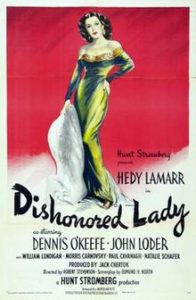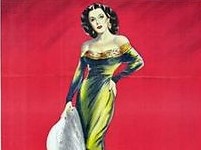Dishonored Lady ** (1947, Hedy Lamarr, Dennis O’Keefe, John Loder) – Classic Movie Review 5966
Director Robert Stevenson’s intriguing 1947 film noir crime melodrama stars Hedy Lamarr as beautiful Madeleine Damien, the mysterious Manhattan magazine fashion lady suspected of larceny and murder, after she becomes a lively party girl at night, attempts suicide and heads towards a breakdown and has to see a psychiatrist. However, she takes up an interest in painting and meets a handsome new neighbour in Dr David Cousins (Dennis O’Keefe), but then a blackmailing ex-suitor implicates her in a murder.
John Loder as Felix Courtland, William Lundigan as Jack Garet, Morris Carnovsky as Dr Richard Caleb, Natalie Schafer as Ethel Royce, Paul Cavanagh as Victor Kranish, Douglass Dumbrille as District Attorney O’Brien and Margaret Hamilton as Mrs Geiger also star in this glossy but empty production of the 1930 play Dishonored Lady by Edward Sheldon and Margaret Ayer Barnes in a production set up by Lamarr herself as producer.
Director Stevenson keeps the pot boiling and gives his star every opportunity to shine. But, alas, despite Lamarr’s sterling work and that of her valiant co-stars, the material is too weak and improbable to have much impact or credibility. And there is an unfortunate reason for this.
It came into censorship problems which sucked the life blood out of the story when the Hays Office insisted that the heroine having two affairs – in Mexico and New York – was overloading the film, and it objected to her night of sordid passion. Eventually Madeleine’s affair in Mexico City was excised, her night of sordid passion was not shown and any suggestion that she was a murderer or would-be murderer was removed.
It is written by Edmund H North, André De Toth and Ben Hecht, shot in black and white by Lucien N Andriot, produced by Hedy Lamarr, Jack Chetok and Hunt Stromberg, scored by Carmen Dragon and designed by Nicolai Remisoff.
Also in the cast are Ransom M Sherman, James Flavin, Nicholas Joy, Reid Kilpatrick, Dewey Robinson, Archie Twitchell, Robert Williams, Ian Wolfe and Gino Corrado.
The script of Joan Crawford’s Letty Lynton (1932) was judged in court to follow the 1930 play Dishonored Lady too closely, despite being based on the 1931 novel Letty Lynton by Marie Belloc Lowndes and a fifth of the film’s profits were given to Edward Sheldon and Margaret Ayer Barnes, consigning Letty Lynton into copyright hell.
The film of Dishonored Lady bears no noticeable resemblance to Letty Lynton. With her film and her role knobbled by the censors, Lamarr isn’t half the fun Crawford was.
© Derek Winnert 2017 Classic Movie Review 5966
Check out more reviews on http://derekwinnert.com



